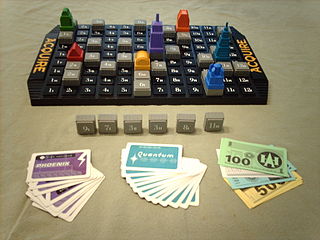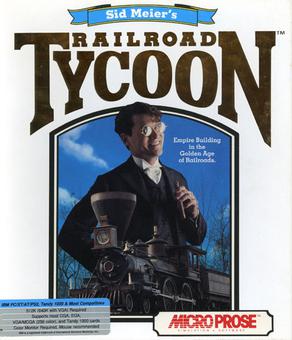
Acquire is a board game published by 3M in 1964 that involves multi-player mergers and acquisitions. It was one of the most popular games in the 3M Bookshelf games series published in the 1960s, and the only one still published in the United States.

Sid Meier's Civilization is a 1991 turn-based strategy 4X video game developed and published by MicroProse. The game was originally developed for MS-DOS running on a PC, and it has undergone numerous revisions for various platforms. The player is tasked with leading an entire human civilization over the course of several millennia by controlling various areas such as urban development, exploration, government, trade, research, and military. The player can control individual units and advance the exploration, conquest and settlement of the game's world. The player can also make such decisions as setting forms of government, tax rates and research priorities. The player's civilization is in competition with other computer-controlled civilizations, with which the player can enter diplomatic relationships that can either end in alliances or lead to war.

A Eurogame, also called a German-style board game, German game, or Euro-style game, is a class of tabletop games that generally has complex rules, indirect player interaction, and multiple ways to score points. Eurogames are sometimes contrasted with American-style board games, which generally involve more luck, conflict, and drama. They are usually less abstract than chess or Go, but more abstract than wargames. Likewise, they generally require more thought and planning than party games such as Pictionary or Trivial Pursuit.

Monopoly is a multiplayer economics-themed board game. In the game, players roll two dice to move around the game board, buying and trading properties and developing them with houses and hotels. Players collect rent from their opponents and aim to drive them into bankruptcy. Money can also be gained or lost through Chance and Community Chest cards and tax squares. Players receive a salary every time they pass "Go" and can end up in jail, from which they cannot move until they have met one of three conditions. House rules, hundreds of different editions, many spin-offs, and related media exist.

Avalon Hill Games Inc. is a game company that publishes wargames and strategic board games. It has also published miniature wargaming rules, role-playing games and sports simulations. It is a subsidiary of Hasbro, and operates under the company's "Hasbro Gaming" division.

Civilization is a board game designed by Francis Tresham, published in the United Kingdom in 1980 by Hartland Trefoil and in the United States in 1981 by Avalon Hill. The Civilization brand is now owned by Hasbro. It was out of print for many years, before it saw republication in 2018, by Gibsons Games. The game typically takes eight or more hours to play and is for two to seven players.

Railroad Tycoon is a business simulation game series. There are five games in the series; the original Railroad Tycoon (1990), Railroad Tycoon Deluxe (1993), Railroad Tycoon II (1998), Railroad Tycoon 3 (2003), and Sid Meier's Railroads! (2006).

MicroProse is an American video game publisher and developer founded by Bill Stealey, Sid Meier, and Andy Hollis in 1982. It developed and published numerous games, including starting the Civilization and X-COM series. Most of their internally developed titles were vehicle simulation and strategy games.

18XX is the generic term for a series of board games that, with a few exceptions, recreate the building of railroad corporations during the 19th century; individual games within the series use particular years in the 19th century as their title, or "18" plus a two or more letter geographical designator. The games 2038, set in the future, and Poseidon and Ur, 1830 BC, both set in ancient history, are also regarded as 18XX titles as their game mechanics and titling nomenclature are similar despite variance from the common railroad/stock-market theme.

Popeye is a 1982 platform game developed and released by Nintendo as an arcade video game. It is based on the comic strip of the same name created by E. C. Segar and licensed from King Features Syndicate. Some sources claim that Ikegami Tsushinki did programming work on the game. As Popeye, the player must collect hearts thrown by Olive Oyl from the top of the screen while being chased by Bluto. Popeye can punch bottles thrown at him, but can only hurt Bluto after eating the one can of spinach present in each level. Unlike Nintendo's earlier Donkey Kong games, there is no jump button. There are three screens.

Railway Rivals is a railroad-themed board game that was originally published by Rostherne Games in 1973. A German language edition was released by Bütehorn in 1979, and a mass-market edition in the UK by Games Workshop in 1985. The game involves railway building and operations.

Empire Builder is a railroad board game originally published by Mayfair Games in 1982 that underwent several editions and eventually branched out into international and fantastical locations.

1830: The Game of Railroads and Robber Barons is a railroad operations and share trading board game first published by Avalon Hill in 1986 based on an original design by Francis Tresham. The popularity of 1830 spawned an industry creating similar "18XX" games. It was the inspiration for Sid Meier's Railroad Tycoon. 1830 was republished in 2011 through a partnership of Mayfair Games and Lookout Games.

Francis Tresham was a British board game designer who produced board games since the early 1970s. Tresham founded and ran games company Hartland Trefoil, a company well-known for its Civilization board game, until its sale to MicroProse in 1997. His 1829 game was the first of the 18xx board game series and some of his board games inspired Sid Meier computer games such as Railroad Tycoon.
Railways of the World is a railway-themed board game designed by Martin Wallace and Glenn Drover and published by Eagle Games. It is a simplified version of Wallace's earlier railway-themed game Age of Steam. The game, first released in 2005, was originally named Railroad Tycoon after the video game series of the same name, featuring box art based on the third entry in the video game series. After the license to use the Railroad Tycoon name expired, the board game has been published under its current Railways of the World title since 2009. It takes place in the eastern United States in 1830. Each player takes charge of a pioneering new railway company.
Civilization is a series of turn-based strategy video games, first released in 1991. Sid Meier developed the first game in the series and has had creative input for most of the rest, and his name is usually included in the formal title of these games, such as Sid Meier's Civilization VI. There are six main games in the series, a number of expansion packs and spin-off games, as well as board games inspired by the video game series. The seventh installment in the series is slated for release on Feb 11, 2025. The series is considered a formative example of the 4X genre, in which players achieve victory through four routes: "eXplore, eXpand, eXploit, and eXterminate".

Sid Meier's Railroad Tycoon is a business simulation designed by Sid Meier. The game is the first in the Railroad Tycoon series. The original idea came from the boardgame 1830: The Game of Railroads and Robber Barons.
1853 is a board game in the 18XX genre published in 1989 by Hartland Trefoil.
A train game or railway game is a board game that represents the construction and operation of railways. Train games are highly involved, hobby board games that simulate the economic and logistic details of running a railway. Like wargames, train games represent a relatively small niche in the games market.

1830: Railroads & Robber Barons is a video game developed by Simtex and published by Avalon Hill in 1995 for MS-DOS.















